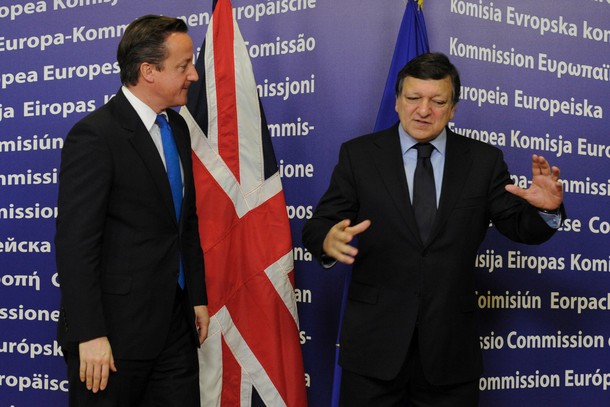
The country most at risk in the eurozone economic crisis is not Spain, Italy, or even Greece, but Britain. While attention has focused on countries that seem perpetually on the brink of sovereign default or banking collapses, the British government has embarked on a path that could lead it out of Europe, with profound consequences for itself and for the U.S.-UK relationship.
Britain’s risk is threefold. First, the City of London is the leading financial hub of the eurozone, even though Britain remains outside the euro. Continued eurozone malaise will inevitably affect the City, as long as investors see that currency and Europe generally as less attractive.
Second, in December the British government decided not to participate in the new European fiscal compact, and also insisted the accord remain apart from EU institutions. This sounds like a highly theological debate, but other EU countries are now convinced that Britain wants no part of Europe’s future. The Cameron government’s credibility in Europe is now close to nil. As a result, Britain will struggle to protect the City and its financial institutions from the EU’s tendency toward strong, sometime punitive, regulations.
Third, the eurozone crisis has emboldened Britain’s eurosceptics, who are calling for a referendum on continued EU membership. Until now, Prime Minister David Cameron has been able to contain those in his party who want to leave the EU, but once his government starts renegotiating Britain’s relationship with the EU, no one knows where it will end. Outside of Europe, Britain will find itself strategically adrift.
Some may argue that Britain is merely abandoning the sinking ship of the European Union. But throughout this crisis, most EU countries have worked to create new institutions and processes that will bind their economic policies ever closer together. At the end of June, for example, they decided to establish EU supervision of major European banks. The eurozone crisis could well lead to a more unified Europe with Britain somewhere on the periphery.
Britain has long had an ambiguous relationship with the EU. Winston Churchill supported European integration from the beginning, but with the understanding that Britain would not participate. Even after Britain joined, its political elites often spoke as though they would prefer to be outside the EU, and the popular media heaped scorn on Brussels. Most European leaders tolerated this ambiguity, but since the British decisions against the fiscal compact in December, they are much less determined to keep Britain in the EU. The decision is Britain’s, they say — to stay is fine, but to leave is fine too.
Decisions made in London over the next few months could determine whether Britain becomes a second-class citizen of the EU — or leaves altogether. A recent YouGov/Chatham House poll indicates that in a referendum, 49 percent of the British public would vote to leave the EU, while only 30 percent would vote to stay, and only 12 percent support British participation in a more integrated EU. As the eurosceptics sense their chance, this debate may spin out of control.
If Britain moves away from the corridors of European power, the U.S.-UK relationship will suffer considerably. The “special relationship” has been central to US ties with Europe, and Britain is often seen as the closest, most effective ally. But severe cuts in defense spending will limit Britain’s ability to join the United States in responding to global security challenges. Britain will have only one deployable aircraft carrier, and will not have fixed wing aircraft suitable for launch off ships until 2018 at the earliest. The U.S.-UK intelligence relationship is also weakening, thanks to WikiLeaks, UK concerns about U.S. information that may have been gained by torture, and US revelations about British agents infiltrating al Qaeda. But even if the defense and intelligence parts of the relationship erode, Britain would still remain a valuable political and economic partner as long as it was influential in the EU. Britain has long been a bulwark against excessive regulation in Europe and it has pushed the EU to be a more active and effective foreign policy player. On its own, Britain is only a medium-size economic power with political influence in certain areas of the globe. As a key EU member, it helps govern the largest economy in the world and its political influence reaches far beyond the Commonwealth. Should the British government walk away from that role, its importance and influence in Washington would decline precipitously.
For the United States, it is time for some frank talk with its closest friend. The March 2012 summit between Prime Minister Cameron and President Obama was an exercise in historical back-slapping. With more focus on the past than on the future, it was a missed opportunity. UK leaders need to hear our concerns about Britain’s capabilities and fading influence. British eurosceptics in particular need to hear that their vision of an Anglo-American partnership righting wrongs around the world is a mirage — Britain simply doesn’t have the resources to keep up with the U.S.
UK leaders are fond of describing their country as a bridge between the United States and Europe, but bridges must have firm foundations on both shores. It is time to build a new vision of the Anglo-American relationship, one based on Britain’s commitment to be a strong leader in the European Union.
Fran Burwell is Vice President and Director of the Transatlantic Relations Program at the Atlantic Council. This piece originally appeared in the Huffington Post. Photo Credit: Getty Images
Image: david%20cameron%20and%20jose%20barosso.jpg
